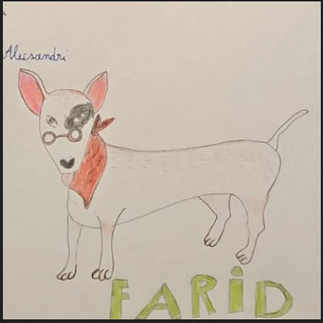Una dintre cărțile preferate ale copiilor, așa cum mă așteptam, a fost Olguța și un bunic de milioane, scrisă de Alex Moldovan. Tiza mea, cu care nu am mai nimic în comun în afară de prenume și câine, după spusele copiilor, este un personaj pus pe șotii, cu o gândire și o exprimare făcute parcă pentru ei.
Îmi dau seama dacă o carte a fost sau nu pe placul elevilor după viteza cu care aceștia o termină de citit și, bineînțeles, după numărul de cereri pentru volumul al II-lea, pe care niciodată nu îl abordez la Clubul de lectură, ci prefer să îi las pe ei să citească suplimentar. Așadar, văzând succesul de care s-a bucurat Olguța în rândul elevilor mei, am decis să contactez și să invit autorul la Clubul nostru de lectură (în format online). Alex Moldovan a acceptat foarte repede invitația (înțeleg că face asta destul de frecvent, ceea ce e demn de toată aprecierea), i-am trimis invitația pentru Zoom și asta a fost.
Copiii erau emoționați la început, dar au prins repede curaj și-l asaltau pe Alex fără milă :)) Întrebările lor urmăreau să descopere detalii de culise - cum ar fi, de unde i-au venit diferite idei -, precum și să dezvăluie ce avea să se întâmple cu Olguța în volumele următoare. Amuzat, deși probabil a auzit de multe ori aceleași întrebări de la elevi din toată țara, el le răspundea răbdător. Când putea, pentru că uneori, alți copiii răspundeau la întrebările colegilor, înainte să apuce să o facă autorul. Nu o să neg, mi-a plăcut tare mult să văd cum făceau asta și îmi dă încredere că, dacă nu înțeleg ceva, piticoții mei știu să discute în echipă și să se ajute unii pe alții.
Întâlnirea cu autorul volumului Olguța și un bunic de milioane nu a durat mai mult de o oră. Dar sunt convinsă că este genul de experiență de învățare care va rămâne în amintirea copiilor mulți ani, pentru că școala românească (prin programa adoptată și prin textele selectate în manuale) nu permite dialogul cu autorii de literatură contemporană.
Întâlnire cu un autor - Alex Moldovan
One of the children's favorite books, as I expected, was Olguța and a millionaire grandfather, written by Alex Moldovan. My namesake, with whom I have nothing in common except the first name and the dog, according to the children, is a character constantly up to mischief, with a way of thinking and of expressing herself that seem as if crafted precisely to their liking.
I can tell if the students liked a book or not by the speed with which they finish reading it and, of course, by the number of requests for volume II, which I never address in Book Club, but prefer to let them read further on, by themselves. So, seeing the success that Olguța enjoyed among my students, I decided to contact the author and invite him to our Reading Club (in online format). Alex Moldovan very quickly and kindly accepted the invitation (I understand that he does this quite often, which is worthy of all appreciation). I sent him the invitation for Zoom and that was it.
The kids were nervous at first, but they quickly built up their courage and attacked Alex mercilessly :)) Their questions aimed to discover behind-the-scenes details - such as where he got different ideas from - as well as to reveal what it would happen to Olguța in the following volumes. Amused, though he probably heard the same questions many times from students all over the country, he answered them patiently. When he could, because sometimes other kids would answer their classmates' questions before the author had a chance. I won't deny it, I really enjoyed watching them do this and it gives me confidence that whenever they have difficulty understanding something, my little ones know how to team chat and help each other out.
The meeting with the author of the volume Olguța and a grandfather of millions did not last more than an hour. But I am convinced that it is the kind of learning experience that will remain in the children's memory for many years, because the Romanian school (through the adopted curriculum and through the texts selected in the textbooks) does not allow dialogue with the authors of contemporary literature.












Comments